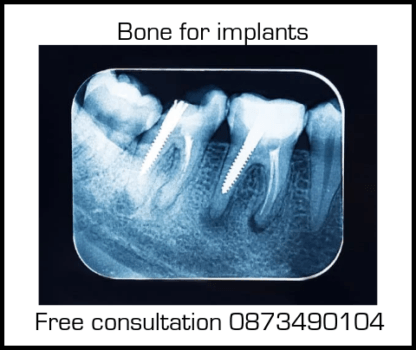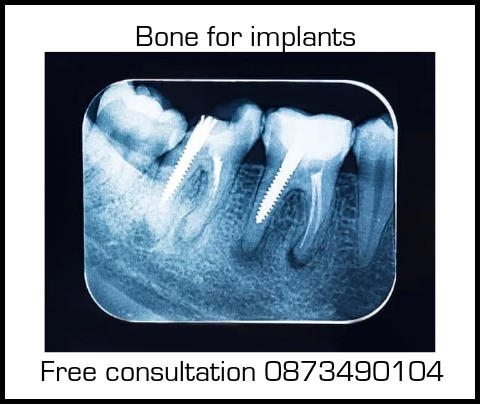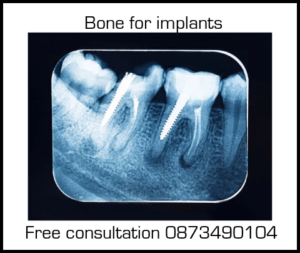In our Hungarian dental clinic in Wexford town we hear a lot about not enough bone for dental implants.
In fact many people in Ireland come to us for a second opinion on their suitably for dental implants treatment.
In this article we are going to take a closer look at the subject of why people upon examination by a dentist are told that you there isn’t enough bone for dental implants.

I will explain why this could be the case,
- Why is there bone loss in the first place
- What can be done about not enough bone for dental implants
- Are dental implants the right choice for you
- Finally where is the best and cheapest place to go to when there is not enough bone for dental implants to allow you to get the treatment.
Why does bone loss occur
Bone loss in the mouth occurs when the gums are not used regularly because of a trauma (extraction) accident, or an infection, another reason could be a natural process known as atrophy or resorption in the gums can cause progressive shrinkage or bone loss.
Resorption or atrophy causes a lack of stimulation during food chewing, it occurs where there is a gap following tooth loss, the aging process also causes resorption as well as gum disease, injury and the wearing of conventional dentures.
Conventional dentures often put pressure on the gums when you chew food, in turn blood supply to the gums is reduced increasing the possibility of not enough bone for dental implants.
When you lose a tooth bone loss occurs
When you lose a tooth, the surrounding tissue and bone over time will shrink, the adjacent gums and bone will remain intact. There are a whole host of reasons why patients lose teeth including the following:
- Trauma or injury
- Dental infection
- Dental cavities
- Gum (periodontal) disease
- Slow developing or defective teeth
When are dental implants a good option
There are number of situations where dental implants are a good option, for example the patient has missing teeth, or a healthy tooth needs to be capped, difficulties in placing a denture or bridge because of unsuitable gums or teeth, or uncomfortable dentures.
When a tooth is lost, it’s very important to stop bone loss occurring, otherwise over time the problem of not insufficent bone for dental implants will cause further issues.
One very important feature of dental implants that is sometimes overlooked is the fact that they play a very significant role in preserving the jawbone and preventing natural shrinkage.
A removable partial denture or a bridge will not preserve or maintain the jawbone in the same way as a dental implant.
Learn more about not enough bone for implants
I suggest that you ring Fintan 0873490104, make an appointment with our Hungarian dentist in Wexford to learn more about not having sufficient bone for dental implants and what we can do for you in Perfect Smile Dental clinic Hungary.
Im sure that our team of dental implants specialists at Perfect Smile dental Hungary can help you with solutions if you are in a situation where there is not enough bone for dental implants.
Not only can we help you where there is bone loss, we can provide top of the range dental implants at much lower prices in our state-of-the-art dental clinic in Hungary than you would have to pay in Ireland.
Fintan can help you organise a free dental consultation with Dr Tamas or Dr Eda in our Wexford town clinic, just call 0873490104 for more information.
A thorough examination

At Hungarian Dental Implant Centre Wexford we can offer each patient in Ireland a free panoramic xray and a thorough examination by our experienced dentists Dr Eda or Dr Tamas.
They need to determine whether or not there is enough bone volume or density to be able to take and support a dental implant where teeth are missing.
If they find that there is not enough bone for an implants, there are options, they can rebuild the bone.
If the gum has receded it can be rebuilt, this very successful treatment is called bone correction or bone augmentation.
The bone and surrounding gum must be built back up before dental implants can be surgically placed.
In the modern dentistry world in most cases where there is not enough bone for dental implants almost all patients can get dental implants, at Perfect Smile Dental clinic Hungary we use a number of techniques to achieve this.
Bone augmentation or bone correction
Bone augmentation or bone correction involves the grafting or addition of human bone or a bone like material to the jawbone, the first and best choice if possible is the patients own bone.
This can be extracted the chin or the rear part of the lower jaw ( ramus) should our Hungarian dentist not be able to procure sufficient bone in these areas, the next to try is your tibia, (shin bone) or hip.
The hip bone is preferred because of the amount of bone it can provide, you will be required to go to a hospital for this procedure, a local anaesthetic will be used, there is no increase in the risk of a hip fracture.
In cases where there’s not enough bone for dental implants not everyone likes the thought of removing bone from their bodies, other sources for materials are used, they include bone sourced from cows or human cadavers.
Bone grafting can also be achieved by using other bone like materials.
Sinus lifting where not enough bone exists
Sinus lifting is part of the solution where not enough bone for implants exists, a sinus lift will increase the height of the upper jawbone when part of the maxillary sinus is filled with bone.
A sinus lift is the recommended treatment when there is a lack of bone for dental implants n the rear part of the upper jaw above the back teeth on either side if the nose.
Expansion of the ridge for not enough bone
In the case where the jawbone isn’t wide enough to support an implant expansion of the ridge is considered by some dentists, this split ridge technique enables the bone to be wide enough for the implants.
Distraction osteogenesis to get implants
To coin a phrase, distraction osteogenesis is quite a mouthful but the process does mean that the height of the bone is increased,l
The dental surgeon will make an incision in the jaw, the bone will be cut to separate it from the rest of the jawbone.
A device made from titanium will be inserted to keep the bone apart, the titanium device is unscrewed a bit more until the space between the jawbone and the bone extends enough to make the height of the bone increase.

Dental implants the treatment
Let’s look at dental implants the procedure, we will assume that the stage where there just isnt sufficent bone for dental implants has been rectified and dental implants treatment is now possible.
Dental implantology is carried out by a dental surgeon under a local anaesthetic, in relative terms the treatment is comfortable, there may be some small vibrations during the bone implant site preparation.
The patient is quite comfortable and relaxed during surgery, it is minimally invasive with no open wounds following the treatment, post opp shouldn’t involve too much discomfort, a course of antibiotics will be prescribed for the following 7 days.
A period of healing
At this point, the problem of a lack of bone for dental implants has been sorted, the implants are in place, the temporary crowns to allow for chewing and eating are in place, the patient has returned to Ireland for aftercare in the Wexford town clinic.
During aftercare, a period of healing will take place, if a number of implants have been placed the healing of the gums will take between 4-6 months, the length of time largely depends on the bone density and the patients general health.
The next step in the dental implant process is the fitting of the permanent crowns on top of the implants, this is achieved by using an abutment or a screw in type of material to hold the dental crowns that look exactly like your own natural teeth.
How successful are dental implants
We have established that a problem like not enough bone for implants can in most cases be fixed, so that means that the life changing nature of dental implants can be made available at much lower prices in Perfect Smile dental clinic in Hungary.
The question asked by manyis how successful are dental implants, they have been available for a long time now, a number of research papers have stated that the success rate of dental implants is at 95%.
Even in situations where there wasnt ample enough bone for dental implants this procedure to replace missing teeth can last a lifetime, it’s quite rare that an implant will not succeed.
Having said that, occasionally dental implants do fail because it doesn’t doesn’t fuse to the bone in a proper way, or complications arise because it becomes loose for a number of reasons that include:
- Too many implants are placed
- An overload is caused
- The dental implant is placed higher than the surrounding teeth
- Causing much stronger chewing and biting force.
Choose a trusted dental professional
If you find yourself in a situation where not enough bone for implants is your main problem.
It’s so important to choose a trusted dental professional that will not only give you the best advice but can provide the treatment that leaves you happy with the outcome.
The outcome being a successful dental implant treatment that enhances the appearance of your missing teeth, your bite, and the price for the treatment is affordable.
To set up a free dental appointment and to learn more about affordable solutions in situations where there isnt sufficient bone for dental implants call Fintan on 0873490104.
Are there risks for dental implants with bone loss?
As stated by many research papers the success rate for dental implants with bone loss is very high, however, the chance that bone correction is always there even in a situation where the patients own bone is used.
Dental professionals and scientists don’t quite know why this is the case, some of the reasons put forward include:
- Patient has been a heavy smoker for a long time
- A medical condition
- Higher risk where outside bone is used
- Uncontrolled diabetes
- Certain drugs for osteoporosis
- Bacterial infection
Conclusion on not enough bone for implants
By now and if you have read this complete article on a lack of bone for dental implants there is a picture emerging in terms of what can be done about bone loss for dental implants.
Contact us on 0873490104 at Hungarian Dental Implant Centre Wexford and Perfect Smile Dental clinic in Hungary for affordable solutions to bone loss for dental implants.
References
https://www.ncbi.nlm.nih.gov/pmc/articles/PMC8158510/
https://www.jomos.org/articles/mbcb/full_html/2021/03/mbcb210012/mbcb210012.html
https://www.cuh.nhs.uk/patient-information/bone-grafting-for-dental-implants

